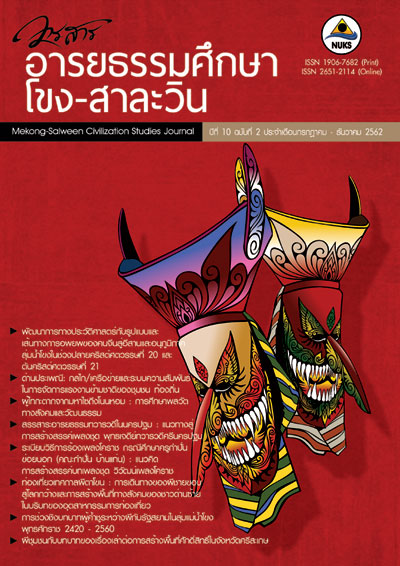ข้อตกลง
1. บทความทุกบทความจะได้รับการพิจารณาจากผู้ทรงคุณวุฒิ (Peer review) ที่ตรงตามสาขาวิชา โดยทุกบทความจะต้องผ่านการพิจารณาจากผู้ทรงคุณวุฒิ อย่างน้อยบทความละ 3 ท่าน
2. บทความ ข้อความ ภาพประกอบ และตารางใด ๆ ที่ตีพิมพ์ในวารสารอารยธรรมศึกษา โขง-สาละวิน เป็นความคิดเห็นส่วนตัวของผู้เขียน กองบรรณาธิการไม่จำเป็นต้องเห็นด้วยเสมอไป และไม่ใช่ความรับผิดชอบของ กองส่งเสริมศิลปวัฒนธรรม มหาวิทยาลัยนเรศวร ถือเป็นความรับผิดชอบของผู้เขียนแต่เพียงผู้เดียว
3. บทความจะต้องไม่เคยตีพิมพ์เผยแพร่ที่ใดมาก่อน และไม่อยู่ระหว่างการพิจารณาของวารสารฉบับอื่น หากตรวจสอบพบว่ามีการตีพิมพ์ซ้ำซ้อน ถือเป็นความรับผิดชอบของผู้เขียนแต่เพียงผู้เดียว
4. บทความที่ส่งถึงกองบรรณาธิการ ขอสงวนสิทธิ์จะไม่ส่งคืน
Tourism of Phi Ta Khon Festival: Voyage of Marginal Spirit to Public World and Social Space of Dan Sai People in Context of Tourism Industry
Tourism of Phi Ta Khon Festival: Voyage of Marginal Spirit to Public World and Social Space of Dan Sai People in Context of Tourism Industry
Keywords:
Phi Ta Khon, Dan Sai, Tourism, Social SpaceAbstract
This article aims to explain change of Phi Ta Khon tradition of Dan Sai District, Loei Province and definition of social space and Identity of Dan Sai people on Phi Ta Khon festival. The qualitative approach was applied. Data was collected by means of depth interviews and documentary analysis, and presented by descriptive
analysis. The results of the study found that; since 1977 late, Phi Ta Khon has changed from the animism and Buddhism based rituals of peasant society’s ways of life to be an activity to support tourism. Phi Ta Khon ritual was offered to be a prominently important tradition and to show off to increasable tourism activities. However, in context of tourism industry of Thailand, Dan Sai people were received this opportunity to present their local identity and culture to society as a whole by defining and promoting the social status of their localities from the marginal city to become a tourism space. This phenomenon has indicated that despite the government's tourism promotion policy has the power to dominate people in the country but local people
can use this policy as bargaining tool as well.
References
Aeusrivongse, N. (1995). Phakaoma Phasin Kankengnai Lae etc.
Wadouyphapenee Kawmpleanplang Lae Reungsubsara.
Bangkok: Matichon.
Chauboonmee P. (2009). Administrative Management of Boonluang
and Phi Ta Khon Festival For Tourism In Dansai District,
Loei Province. Master of Arts (Thai Studies for Development)
Thesis. Loei Rajjabhut University.
Kaengjampa, N. (2012). Dynamics of Contesting “Tourist Space” of
Dansai Border People, Loei Province, 1977-2009. Master
of Arts (History) Thesis. Chaingmai University.
Lefebvre, H. (1991). The Production of Space. Oxford: Wiley-Blackwell.
Potjanalawan, P. (2009). The Production of “Thailand Space” in
Development Era 1957-1966. Master of Arts (History) Thesis.
Chaingmai University.
Saratussananant, S. (2008). Phitakhon. Loei: Loei Rajjabhut University.
Ta n t h o n g , C . ( 2 0 1 7 ) . C h o l t e e t a n g t o o k k h o n g p h o
Songkumlangjaihaitahanphakthai, retrieved on 3 December
, from from https:// news. thaieasyjob.com /entertain/
show_news-2307-1.html
Tourism Authority of Thailand. (1987). Kantidtamrainganphonkron
gkarnpithongtiew 1987.Bangkok: n.p.
Tourism Authority of Thailand. (2006). Rainganprajampi 2006.
Bangkok:TTT.
Upala, S. (2003). Development of Phitakhon Tradition in Dansai
District, Loei Province. Master of Arts (Thai Studies for
Development) Thesis. Loei Rajjabhut University.
Vallibhotama, S. (2005). PhikubBhudh: Religion and belief in Dan
Sai society. Moral equilibrium of the Villagers in Man
River Basin. Bangkok: Lek Praphai Viriyahpant Foundation.
Winichakul, T. (1993). The other within: Ethnography and Tra
velliterature from Bangkok Metropolis to its periphery in the
late nineteenth century Siam. Paper to be presented at The
fifth international conference on Thai Studies, July 4-10,
, SOAS, University of London.
Wungkeeree, B. (2008). Folk Literature In Luang Phrabang Laotian
Communities And Its Role In Transmitting Luang Phrabang
Laoness In Thai Social Context. Ph.D. (Literature and
comparative Literature) Thesis. Chulalongkorn University.








